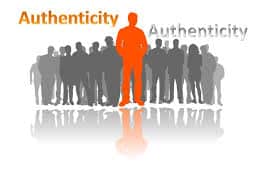Businesses must develop leaders that uphold high ethical standards, accept accountability, take responsibility for their actions, and make decisions based on long-term goals rather than immediate gratification. The best leaders are authentic leaders, those who guide their daily operations by their moral sense and earn the respect of their subordinates, peers, and shareholders. Through this guide, we will understand what it means to be an authentic leader, and also know the leadership theory, including the strategies and development of being one.
Authentic Leadership
Authentic leadership is a management style that is defined by sincere, self-aware, and open leaders. An authentic leader may inspire loyalty and trust in her workers by constantly communicating who she is as a person and how she feels about her colleagues’ performance.
For example, authentic leaders inspire those they lead by remaining loyal to their ideals. They are self-aware and will not be misled into doing what they believe is the correct decision. They have a strong moral code and are capable of being sensible and stable in the face of adversity.
What Are The Four Qualities Of Authentic Leadership?
The following are the four components of true leadership:
#1. Self-awareness
Authentic leaders reflect on their weaknesses, strengths, and ideals to communicate more authentically with their team members. Additionally, self-awareness requires self-reflection, requesting feedback, and being sensitive to the sentiments of your coworkers.
#2. Balanced Analytical Reasoning
Authentic leaders must examine both supportive and opposing opinions while making a group decision. When this processing technique is used, employees are more eager to discuss their thoughts and experiences, which helps avoid future problems.
#3. Constructive Criticism
Authentic leaders must be willing to be upfront about their thoughts and feelings, as well as their professional relationships. This may include providing constructive feedback to team members and, when required, admitting mistakes. A genuine leader sets an example and promotes transparency in the workplace.
#4. Internalized moral perspective
True CEOs prioritize the demands of the business over their own. A true leader’s core goal is the organization’s success, even if this requires more obstacles and labor.
How Important Is Authentic Leadership In Society?
Genuine leadership promotes open communication among team members and has far-reaching impacts inside a department. When team members believe their concerns will be addressed and acknowledged, their morale will improve. Productivity increases when members of teamwork together under the supervision of a competent leader. Genuine leadership produces a positive business culture, which in turn fosters a favorable brand image in the marketplace.
Authentic Leadership Theory
Authenticity requires self-awareness and the ability to act by one’s true self. The “authentic leadership” theory is a complex one that combines authentic and humanistic notions with leadership theory in the belief that being true to oneself results in more good outcomes. Authentic leadership theory can be used in conjunction with any other style of leadership and has a significant impact on the workplace.
Positive psychologic capabilities, moral reasoning, and critical life events all affect the development of a real leader, according to authentic leadership theory. Let us look at what they stand for in making an authentic leader.
#1. Positive Psychologic Capabilities
These include balanced cognitive reasoning and resilience. When faced with difficult decisions, a leader’s resiliency and ability to think to enable him or her to overcome obstacles, confront problems, and explore alternative points of view. Leaders with a well-balanced cognitive processing capability can see multiple perspectives and objectively assess all data. Making objective judgments while taking all relevant viewpoints and data into account is a component of balanced processing. When making decisions, leaders with this characteristic typically seek out opinions that are opposed to their own.
#2. Moral Reasoning
In discussing the theory of authentic leadership, this is the decision-making process necessary to address moral and ethical dilemmas, whereas major life experiences are adversities or personal crises that help people mature. Authentic leaders frequently have life stories about how a tragedy or series of catastrophes helped them develop self-awareness and discover the life purpose that drives their leadership authenticity.
#3. Critical Life Events
This typically helps a leader acquire a stronger sense of compassion and humanism, which improves the leader’s capacity to connect with followers. Important characteristics of real leaders are supported in their growth by underlying positive psychology and moral reasoning, as well as key life events.
What Is Authentic Leadership?
Authentic leadership begins with a leader’s awareness, which helps him to develop solid relationships and appropriately inspire and drive coworkers. The value of an open environment cannot be emphasized. According to George, authenticity is one of the most critical attributes of a leader.
Key Qualities Of Authentic Leaders
There are numerous components to authentic leadership, but it’s vital, to begin with, the characteristics associated with this kind of leadership. To begin, a real leader possesses self-awareness and sincerity.
He is aware of himself, his value, and his limitations. He receives respect from those around him as a result of displaying his actual self. Second, a true leader is unselfish. Attaining corporate SMART goals requires a collaborative effort, not something someone can brag about. SMART goals mean SPECIFIC, MEASURABLE, ACHIEVABLE, ATTAINABLE, REALISTIC, and TIME. Every decision must be tailored to meet these goals.
A true leader is motivated by something other than power, money, or ego. A trustworthy leader prioritizes the organization’s objectives. He or she does, however, focus on the long term, assisting in the organization’s appropriate direction.
Genuine leaders are unafraid to demonstrate their emotions and vulnerability. They can form bonds with their employees. This is not to mean they are simple to manage. It’s about arguing with empathy without losing logic.
People admire honest leaders for their dependability and trustworthiness. They take responsibility for their acts and wish for others to do the same. They are capable of listening to their instincts and expressing their thoughts based on their own experiences.
Authentic Leadership Strategies
The following strategies can assist you in establishing an authentic leadership style:
Attend and contribute your opinions.
#1. Good Listening
This is the bedrock of a strong relationship with employees and stakeholders. Not only should you listen, but you should also allow others to bounce ideas off of you and consider their perspectives. Employees will be more able to express themselves freely and be receptive to one another if they regularly share ideas, information, suggestions, and opinions (for example, during meetings).
#2. Principled
A principled approach indicates the leader’s attachment to previous decisions. Even though he will occasionally be forced to make difficult choices, he will be trustworthy. Reversing an earlier decision will erode his credibility unless there is an explicit and compelling reason to do so.
#3. Constructive
It’s natural to be cynical. It’s entirely up to how you approach it. It is critical to deliver criticism constructively and politely. The recipient of the feedback should feel no emotional disturbance as a result of it. Sensitive issues should always be handled candidly and constructively, preferably in person.
#4. Realistic
Each day is unique in its way, as are the circumstances. As a result, goals must be adjusted frequently. For the sake of the organization’s objective and vision, it is better if the true leader adheres to a predetermined realistic target. It is permitted to deviate from this norm only when there are compelling and observable reasons to do so. By focusing on the end goal, the leader thus develops self-awareness and effectiveness.
#5. Delegate
Delegating requires ceding control and developing an ability to trust others. This is also a difficult task for many leaders. The most frequent error made in this area is, however, looking over employees’ shoulders and correcting them. Delegating is a critical component of true leadership because it enables you to rely on your employees’ knowledge and abilities.
Authentic Leadership Development
Authentic leadership development is about utilizing your unique personality and life narrative to meet the needs of a diverse range of stakeholders, which also include consumers, employees, investors, and society as a whole. In the development and maintenance of good authentic leadership, all leaders must master the nine characteristics listed below.
#1. Identifying and Nurturing Your Passion
In the development of authentic leadership, genuine leaders perform meaningful tasks, and their excitement rubs off on others. They are less anxious and happier as a result of this. Employees report feeling more engaged at work when their supervisors are passionate about their work. Both their enthusiasm and vitality rub off on others, creating an atmosphere conducive to creativity. They direct their zeal toward something greater than themselves.
#2. Maintain A Humble Manner
Genuine leaders are confident in their humility. They are aware of their strengths and weaknesses, extolling their virtues while acknowledging their failings; also they are strong in their convictions but are also quick to admit when they are wrong. They enlist others’ assistance, then share the spotlight with them and express gratitude for their assistance.
#3. Embrace Your Life Story
We can proceed by connecting the dots in reverse order. Genuine leaders acquire knowledge from personal experiences. They also take the initiative in their biography by imparting knowledge to others. Genuine leaders draw significance from their personal history. Their profoundly emotional stories enable them to establish bonds with others. Because our brains are wired to feel more empathy when we hear wonderful stories, their life story serves as a source of motivation and inspiration.
#4. Maintain A Growth Mindset
Authenticity requires time and work, but it pays off in the long term. It’s similar to exercising: you become tired when you’re doing it, but you know it’s good for your body. Authenticity is a work in progress and a never-ending process of self-discovery. Genuine leaders believe that there is always room for improvement and that education never ends. Carol Dweck, the inventor of the phrase “growth mindset,” recommends the following method for creating one: Consider a period when you effectively overcame a learning obstacle and resolved an issue. How did it affect you?
#5. Develop Empathy And A Pleasant Attitude Toward People
Empathy is one of the characteristics that set a true leader apart from the pack when it comes to building high-quality relationships. Leaders hence, rely on others to complete tasks and accomplish business goals. Great leaders are also able to establish rapport with people and are responsive to constructive criticism. According to a study, we tend to overstate our leadership talents; the majority of us regard ourselves too highly. Genuine leaders also reconcile their perceptions with the feedback they receive from others.
#6: Resilience To Adversity
Authentic leaders have also learned the ability to persevere in the face of adversity in terms of leadership development. For them, failure is always an option. They also can transform bad news into good news. If you are sincere in your work and life, you will feel more comfortable confessing your mistakes. Genuine leaders however possess a sense of self-control and an internal compass. Authentic leaders are thus those who can play to their strengths in the face of adversity.
#7. Establish A Positive Example
Distribute information, delegate decision-making authority, and help individuals in reaching their full potential. Genuine leaders demonstrate their leadership by walking the talk. Consider the CEO of a significant German multinational firm. He visits each location of the organization, instilling the company’s values of respect and empowerment. By taking this method, he establishes a positive cycle that encourages people to stick to their convictions.
#8. Create A Community
Avoid short-term goals and express the company’s long-term vision. Create genuine moments. Create a single culture and identity that is built on common ideals and is embraced by all employees. Authentic leaders shift their focus away from egotistical behavior and toward collaboration. Google’s new CEO Sundar Pichai exemplifies this leadership strategy with his tagline, “Let others thrive.”
#9. Ability To Leave A Legacy.
It’s an excellent way to begin: accomplish well by doing good. Consider the viewpoints of a diverse group of stakeholders. Create a circle of virtuous riches and strive for long-term growth. Authentic leaders consider today’s challenges without jeopardizing the future. It is never too early to consider the type of impact you wish to have on the world.
Authentic individuals experience enhanced levels of happiness, self-esteem, thanks, and improved interpersonal interactions. Maintaining authenticity in leadership and life is difficult, but it is observable, quantifiable, and learnable.
What Is Authentic Leadership and Why Is It Important?
Authentic leadership is a management style that is defined by sincere, self-aware, and open leaders. An authentic leader is important because they inspire loyalty and trust in her workers by constantly communicating who she is as a person and how she feels about her colleagues’ performance.
What Is an Example of Authentic Leadership?
Throughout history, authentic leadership has been demonstrated numerous times. For example, Mahatma Gandhi, Nelson Mandela, and Martin Luther King Jr. are all well-known authentic leaders. They all desired the best for their people and went to great lengths to accomplish their objectives.
What Is the Focus of Authentic Leadership?
Authentic leaders have a clear mission and are results-oriented. They can prioritize the organization’s objectives and goals over their interests. They work for the sake of getting things done, not for their own power, money, or ego.
What Is a Strength of Authentic Leadership?
Researchers and psychologists have identified four key characteristics of authentic leaders: self-awareness, honesty in interpersonal interactions, objectivity in making decisions, and a strong moral compass.
How Do You Promote Authenticity?
The role of leaders in encouraging authenticity on the job.
- Demonstrate compassion when in charge.
- Taking an interest in the full person is a sign of respect.
- It’s important to hear people out and act on their comments.
- Make comfortable places for having tough talks.
- Be a leader who prioritizes everyone’s inclusion and sense of belonging.
- Encourage growth on all levels.
- Dole out chances to gain knowledge.
What Is an Example of an Authentic Person?
Your consideration for others is exemplary. Genuine people are those who give freely of their time and resources and show consideration for others. You may place yourself in another person’s position and understand things from their point of view. There is always something in common with other people, no matter how dissimilar you may be.
What Is the Core of Authentic Leadership?
Authentic leadership is a style of management that prioritizes honesty, introspection, and openness. A leader with an authentic leadership attitude will always prioritize being honest, ethical, fair, and doing the right thing.






